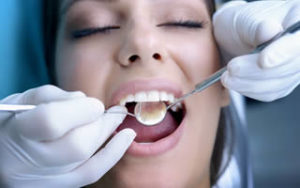How Often Should You Have A Dental Check-up?
Chelmsford dentist, Bhavin Bhuna, looks at recent articles suggesting yearly check-ups are sufficient
 With dental practices being open, but still affected by the current Covid situation, it isn’t surprising that there have been a number of news articles about oral care. Some of these have been slightly ‘sensationalist’ but some have covered worthwhile topics.
With dental practices being open, but still affected by the current Covid situation, it isn’t surprising that there have been a number of news articles about oral care. Some of these have been slightly ‘sensationalist’ but some have covered worthwhile topics.
One which caught our eye claimed that there was little benefit in a patient having their teeth checked every six months. It is always worth challenging commonly held assumptions, and the six monthly check up that we carry out at Blue Sky Dental has been the backbone of a long standing preventative oral health care strategy.
In our view, unless more evidence comes to light that suggests the opposite, we believe that our Chelmsford patients should continue to have their teeth and gums checked every six months. There are a number of reasons for this, some of which are listed below.
Tooth decay
One of the most common oral problems that people suffer from is tooth decay. Whether this is caused by a failure to brush correctly or due to having a ‘sweet tooth’, anyone who has had decay will know just how uncomfortable a toothache can be. Tooth decay is also progressive and even the tiniest cavity formed will very likely get bigger as time passes. We believe that it is important to detect tooth decay as early as possible. Extending the period of time between checkups from 6 months to 12, or even longer as some have suggested, is likely to mean that more patients will suffer from painful toothaches, and cavities that could have been restored with a straightforward tooth filling may require more extensive treatment, or worse still, teeth may need to be extracted.
Gum Disease
Gum disease is another progressive problem that benefits from being checked at regular intervals. Although it is relatively common, it is often resolved when we improve our brushing and flossing. This is not always the case though and sometimes requires professional intervention. The outcome of this is more likely to be positive at an earlier, rather than a later, stage.
Earlier stage gum disease is known as gingivitis and this affects the soft tissue of the gums only. It can be unpleasant and uncomfortable, revealing symptoms such as inflamed and painful gums, bleeding of the gums when brushing and also bad breath. Ultimately though, this can often be resolved through a combination of a ‘scale and polish’ procedures carried out by a hygienist and an improvement in your own oral care.
Where gingivitis is left to advance, it can start to adversely affect other nearby structures including the roots of the teeth and even the supportive bone which holds them in place. When this happens, not only are the previously mentioned symptoms likely to appear but, as the bone deteriorates, the teeth may become loose and even fall out.
This latter stage is known as periodontitis and may require a highly invasive treatment known as a deep clean or ‘root scaling’ in order to try to prevent tooth loss. This is not guaranteed to succeed though and tooth loss may be the end result. Because of this, we firmly believe that you should see a dental hygienist as well as your dentist every six months to have your gum health check. Those more vulnerable to gum disease, such as diabetics, should consider seeing the hygienist at more regular intervals which they will discuss with you.
Oral cancer
One very important aspect of the checks that your dentist carries out is that it enables them to spot any issues with the soft tissues of your mouth such as the tongue or cheeks. Symptoms such as lesions, lumps and persistent mouth ulcers can be caused by a number of things. For example, a dentist may be able to see that a graze on the tongue has been caused by a rough edge on a tooth which can easily be addressed. Other issues that have no obvious cause though should be checked with your GP and we will refer you if we are concerned about anything we detect at your examination.
Oral cancers are more prevalent than you might expect and early detection means that treatment is likely to provide a better outcome than if the condition is left to become worse. Mouth cancer can have a major effect on your life and can even prove fatal. For more information on this, please take a look at the Cancer Research UK website.
Healthy teeth
There is a debate that some people who have very few dental problems and have healthy teeth may be suitable for less frequent check-ups. Whilst this could be suitable for some people with very stable oral health, there is always a risk and our belief is that it is better to be safe rather than sorry.
To summarise, we believe that you should continue to have your mouth health checked at the current six monthly intervals, but should this change following further research, we will let you know. To book your check up appointment at Blue Sky Dental, please call us on 01245 211070.
Bhavin Bhuna – Specialist Endodontist – GDC number 76716

Leave a Reply
You must be logged in to post a comment.